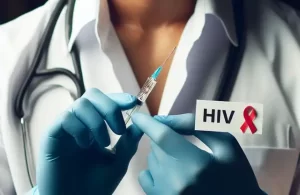New Research Suggests COVID-19 Vaccines May Help Treat Cancer
- Can Cytokine Modulation Enhance the Efficacy of CAR-T Cell Therapy?
- What Are HIV-Related Cancers and How Can They Be Prevented?
- Metformin: From Diabetes Treatment to a New Approach for HIV Cure
- Advances in Research on HPV-Related Oropharyngeal Cancer and Immunotherapy
- Could mRNA Vaccines Be the Dawn of a New Era in Cancer Immunotherapy?
- Parkinson’s and Alzheimer’s Diseases May Originate in the Gut!
New Research Suggests COVID-19 Vaccines May Help Treat Cancer
- Shocking! All existing AIDS vaccine developments have failed
- Sanofi Japan Data Breach: 730000 Healthcare Professionals’ Information Exposed
- CT Radiation Exposure Linked to Blood Cancer in Children and Adolescents
- FDA has mandated a top-level black box warning for all marketed CAR-T therapies
- Can people with high blood pressure eat peanuts?
- What is the difference between dopamine and dobutamine?
- How long can the patient live after heart stent surgery?
New Research Suggests COVID-19 Vaccines May Help Treat Cancer
On September 17, Dr. Adam Grippin and his research team announced findings that cancer patients who received a COVID-19 mRNA vaccine had double the lifespan compared to those who didn’t. The study also highlighted that COVID-19 vaccines may enhance the effectiveness of PD-L1 immunotherapy.
Dr. Grippin’s team suggests that the COVID-19 vaccine activates the immune system in ways that could challenge the traditional principles of cancer vaccines. Combining the COVID-19 vaccine with PD-L1-targeted immunotherapy could trigger an anti-tumor immune response and improve long-term survival chances for patients.
Some scientists believe the mRNA technology used in these vaccines acts as an adjuvant, boosting the innate immune system, and noted that this study supports the hypothesis that mRNA vaccines might increase the overall survival rate of cancer patients. Future animal and clinical trials should consider including COVID-19 mRNA vaccines as a control.
COVID-19 Vaccines and Cancer Treatment: A New Hope?
Dr. Adam Grippin and his team conducted a groundbreaking study analyzing data from over 8,000 cancer patients. They found that patients with non-small cell lung cancer or metastatic melanoma who received both the COVID-19 mRNA vaccine and PD-1 immunotherapy lived twice as long as those who didn’t receive the vaccine. Further analysis revealed that the COVID-19 vaccine enhances the effectiveness of PD-L1 immunotherapy, a treatment former U.S. President Jimmy Carter used to successfully treat his cancer. The study also found that the vaccine may help overcome resistance to lung cancer treatments.
This research was presented at the European Society for Medical Oncology (ESMO) annual meeting on September 17, 2024.

COVID-19 mRNA Vaccines: From Pandemic Defense to Cancer Therapy
Since the release of Pfizer and Moderna’s mRNA vaccines in December 2020, over 13 billion doses have been administered globally. Dr. Katalin Karikó, who was awarded the 2023 Nobel Prize in Physiology or Medicine for her work on nucleoside modifications, originally aimed to develop mRNA cancer vaccines, with COVID-19 vaccines emerging as an unexpected result of that research.
Increased PD-L1 Expression in Cancer Patients Following COVID-19 Vaccination
Dr. Grippin and his colleagues studied data from 2,358 Stage III-IV lung cancer patients at MD Anderson Cancer Center from August 2019 to August 2023. They found that patients who received the COVID-19 mRNA vaccine within 100 days prior to a biopsy had a higher rate of PD-L1 expression (greater than 50% tumor cell positivity) compared to unvaccinated patients. This higher expression suggests these patients are more suitable for PD-L1-targeted therapies, which might otherwise be inaccessible to many cancer patients due to low PD-L1 expression.

Dr. Grippin noted that similar results were not seen with non-mRNA vaccines, such as those for pneumonia or influenza, indicating a unique effect of mRNA vaccines.
COVID-19 Vaccines Boosting Immune Response in Cancer
To validate these findings, Dr. Grippin’s team analyzed over 5,500 pathology reports from MD Anderson Cancer Center, examining PD-L1 expression across different cancer types. They found that patients vaccinated with the COVID-19 mRNA vaccine within 100 days of their biopsy had significantly higher tumor positivity rates compared to those who had not been vaccinated or were vaccinated more than 100 days earlier.
A report from the journal Vaccine in March 2022 highlighted a 72-year-old woman whose metastatic melanoma nodules shrank after receiving her second and third doses of the Pfizer-BioNTech COVID-19 vaccine, suggesting the vaccine may have triggered her immune system to combat the cancer.

Further analysis of 214 metastatic melanoma patients from August 2019 to August 2023 revealed that patients vaccinated with the COVID-19 mRNA vaccine had better survival rates compared to those who weren’t vaccinated.
Conclusion: COVID-19 Vaccines and Immunotherapy Show Promise
The study concluded that combining COVID-19 vaccines with PD-L1 immunotherapy could induce a strong anti-tumor immune response, potentially leading to longer survival. Remarkably, the lifespan of vaccinated patients was double that of unvaccinated patients.
While personalized mRNA cancer vaccines may not be available soon, these results are encouraging. Dr. Grippin remarked, “Using the COVID-19 vaccine could deliver 50-80% of the benefits of personalized cancer vaccines, significantly improving survival rates.” He emphasized the importance of exploring available, cost-effective treatments to enhance life-saving therapies.
Future Research and Implications
The searchers find the research on COVID-19 vaccines boosting cancer survival rates intriguing. He notes that mRNA vaccine trials have increased over the past two years, especially in the context of PD-1/PD-L1 immunotherapies, which had previously led to the failure of many cancer vaccines.
They suggests that the mRNA carrier, rather than the cancer vaccine itself, may act as an immunogenic agent, triggering the innate immune system in a manner similar to an adjuvant.
Moving forward, researchers suggest that COVID-19 mRNA vaccines should be used as controls in future animal and clinical studies on cancer.
New Research Suggests COVID-19 Vaccines May Help Treat Cancer
_________________________________
(source:internet, reference only)
Disclaimer of medicaltrend.org
Important Note: The information provided is for informational purposes only and should not be considered as medical advice.



